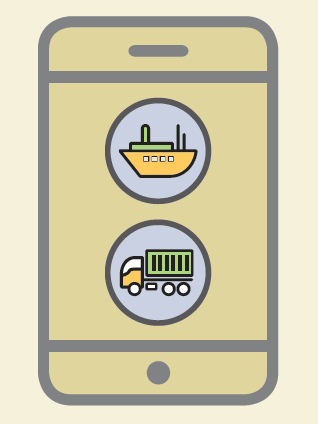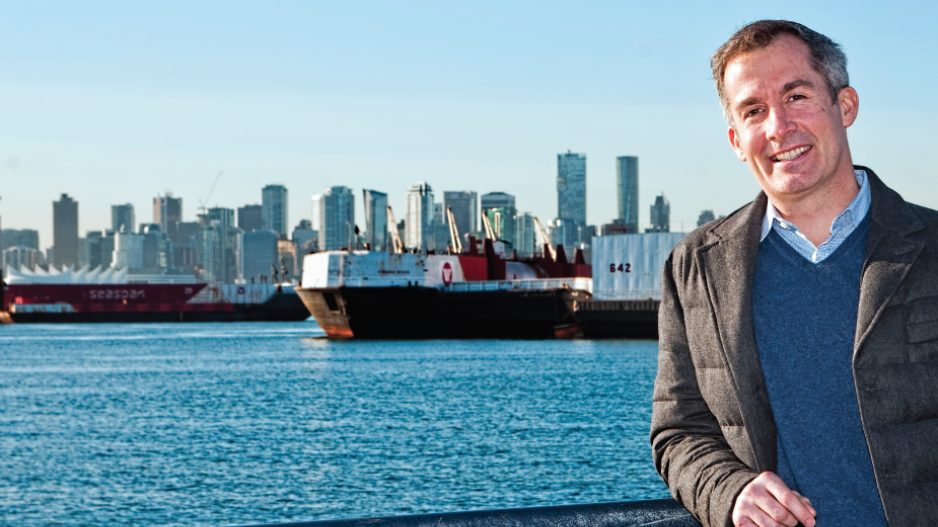A North Vancouver company is launching an app that could clear the major roadblock from small truck operators doing business and getting paid.
Go99, created by Surespan Group of Companies, connects truckers directly to shippers and ensures payday is the next day. The app joins a dense cloud of digitization that permeates the logistics supply chain. From GPS tracking, telematics and robotics to e-commerce software, the transport industry has shifted into the passing lane, says a commentator on industry trends.
“Traditionally, you have a truck, trailer and a driver, and it hasn’t been looked at as a very innovative space,” admits Ryan Ernst, a senior manager at Deloitte who speaks on disruptive technologies affecting supply chains. “But when you actually see the investments being made by the freight companies over the last 10 to 15 years, they’ve been at the forefront.”
Go99’s toehold on tomorrow is small owner-operator trucking companies looking to move simple freight jobs. Historically, freight brokers have overseen the supply-demand relationship for shippers and carriers. However, many surface freight transactions don’t require a middleman, says Devlin Fenton, CEO of Go99.
“If I’m moving lumber or containers, there are standard dimensions and maximum weight,” Fenton says. “It’s really simple. You shouldn’t need a third party to get between a shipper and a carrier, versus something much more complicated that’s overweight and over-dimensional.”
The removal of the freight broker from the shipping equation has spurred what the industry has dubbed the “Uberization of freight.” Fenton says a more apt analogy is Airbnb, with automation optimizing underused capacity. He describes the shape of Go99’s business model as a triangle where the vertical axis is complexity and horizontal is volume. Go99 is focused on the wide-body bottom and looking up, he says.
“There are a whole lot of surface freight jobs at the bottom of the triangle that shouldn’t need much help,” Fenton says. “Most of that work should be automated. That’s where we’re looking at first – starting at the bottom of the triangle and working our way up until we meet market resistance where either the shipper or the carrier is uncomfortable with the complexity of the load.”
On Go99, shippers post a load to the app’s community, and carriers provide competing quotes in real time. The app will provide shippers with historical data on average pricing, while carriers will have a record of their previous submissions’ success. Ratings for preferred vendors are also offered.
There is other popular industry matchmaking software available, such as Loadlink and uShip, but they allow entry to freight brokers. Not only are these commerce communities a digitization of the status quo, but also freight brokers can profit online without perspiring.
Kelly Ficociello, owner of Mak Transportation Services, says load board sites can attract freight brokers with no skin in the game. Go99 is truly disruptive technology in that it removes the in-between taking a cut of the action.
“[With Go99], first and foremost, you’re getting rid of that middleman who isn’t doing anything,” says Ficociello. “There are so many load board sites where you don’t have to have trucks. That freight broker – his costs are a phone and a fax. Not even that anymore, he just needs access to email.”
Louise Yako, president and CEO of the BC Trucking Association, supports the streamlining of simple surface freight transactions.
“To the extent you can take out the middleman and put the driver or the owner of the equipment in direct contact with the customer, I think that really just improves customer service,” Yako says.
Fenton estimates freight brokers can take 15% to 40% of a transaction’s value. Truckers are left having to guess the total take because the freight broker doesn’t disclose the contracted price. Importantly, there is also the risk of the shipper or freight broker defaulting on payment to the trucker. Truckers relying on freight bill factoring – using a financial institution to provide advances on a company’s accounts receivable – are additionally at risk. Go99 guarantees payment to truckers the day after a delivery. The app takes 20% of a transaction’s contracted value.
“We have almost a factoring agreement with our carriers, that in order to pay them next day we are taking the burden on the collection, and that incurs a fee,” explains Fenton. “There are not many other businesses willing to take the same risks on this community that we are.”
Ficociello says financial certainty is a big selling point.
“I’ve got a couple of guys that have two or three trucks,” Ficociello says, “and they are so pumped about [Go99] because even though they’re going to take 20%, you’re going to get paid the next day. And they’re never able to come back to you and say, ‘Oh, we didn’t collect the money.’”
Go99 might improve margins for both shipper and trucker. Seattle-based Convoy, a digitized brokerage that sets prices for surface freight, reports shippers are paying less and truck drivers are getting the same or more than they had been making previously.
For jobs beyond simple surface shipments, however, both Fenton and Ficociello promote freight brokers. But e-commerce software like Go99 and Convoy will likely push freight brokers to more hands-on, service-oriented work for complex freight that can never be coded.
Mark Linton, president of KML Logistics and chairman of Canada’s National Transportation Brokers Association, acknowledges “there’s definitely a place” for Go99, but warns that all shipments can pose problems that automation can’t solve.
“I have to embrace technology and innovation or else we could be blindsided and lose our businesses,” Linton says. “But while I don’t like using the term, the broker business is somewhat old school, based on human interaction with the client to solve their problems. Our target client has multiple lanes of traffic, multiple requirements, various off-load environments, and then we provide the solutions. You will not be able to get that from an Uber-type technology.”
Go99, named after citizens-band radio code for “mission accomplished,” soft-launched in January, serving Surespan’s preferred carriers and shippers. In the first three weeks, the app processed approximately $70,000 worth of transactions. Go99 intends to ramp up features and functionality before its official launch mid-year. Fenton says the app will build out its community locally, focusing first on corridors serving the Lower Mainland. The app is based on feedback from several months of boots-on-the-ground work interviewing nearly 100 drivers at truck stops.
“One of the founding values that we built the company on was empowering the underdog and underserved,” Fenton says. “We see Go99 as an opportunity to provide the business tools to owner-operator truckers. On the front end, we will provide the sales support and funnel of work for you. And, on the back end, we’ll support your invoicing and accounting.”
 Go99 taking patient, proof-of-concept approach to market
Go99 taking patient, proof-of-concept approach to market
Surespan Digital is not looking to put the pedal to the metal to get Go99 to market, says the company’s CEO.
In the mobile app world, there is no programming code for “net earnings.” On the big stage, Snapchat reported a $514 million loss for 2016, while Twitter continues to post consecutive quarterly losses over the last three years. On the smaller scene, mobile app startups can quickly run out of cash before drawing a suitable crowd.
Business is truly a binary world, though – profit or perish. And, when it comes to outside investors, board members can be bullies. However, Devlin Fenton, CEO of Go99, says his mobile app has the full backing of the leadership of Surespan Group of Companies, which spends up to
$3 million on surface freight shipping annually. Full internal ownership and funding gives Go99 the autonomy to move at a pace it’s comfortable with, he explains.
“There have been many players over the last four years that have tried to do something and then crashed, usually because they’re either releasing too quickly, they’re over-leveraged or the business model hasn’t been thought through,” says Fenton. “We’re looking at building this as a startup for ourselves and for the industry. We’re in this for the long haul.”
Go99 is emphasizing proof of concept as it carefully steps out into the marketplace. The app’s soft launch targeted 20 shippers and an equal number of truckers from Surespan’s network. Fenton admits building the app was the easy part, while “the recruiting of new users will be the hardest challenge.”
As a business-to-business app for a specific industry, Go99’s target audience is more precise. That being said, the financial opportunity is large. Fenton estimates the North American market for surface freight is approaching skyward of $800 billion in revenue annually.
The company is already promoting its app at industry trade shows and spreading the word on social media channels. Go99’s website allows users to register and download the app before its official June launch. However, the real selling point will be an app that’s easy to use and does what it says it will do. Fenton says the addition of new users has to be seamless and quality must be paramount to avoid attrition.
“These are big-fingered, big-thumbed truckers,” says Fenton of Go99’s interface. “That’s a real persona we have to design for. We’re looking at being complementary to their work, lowest barrier to entry, and easiest to use. At the end of the day, technology must either be beautiful or invisible. Anything in between is not on our radar.”




